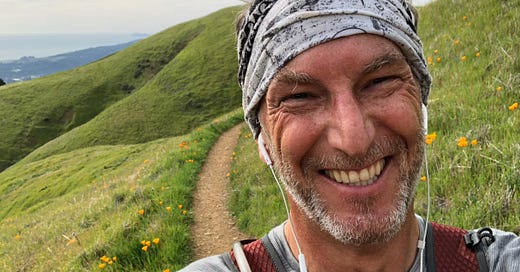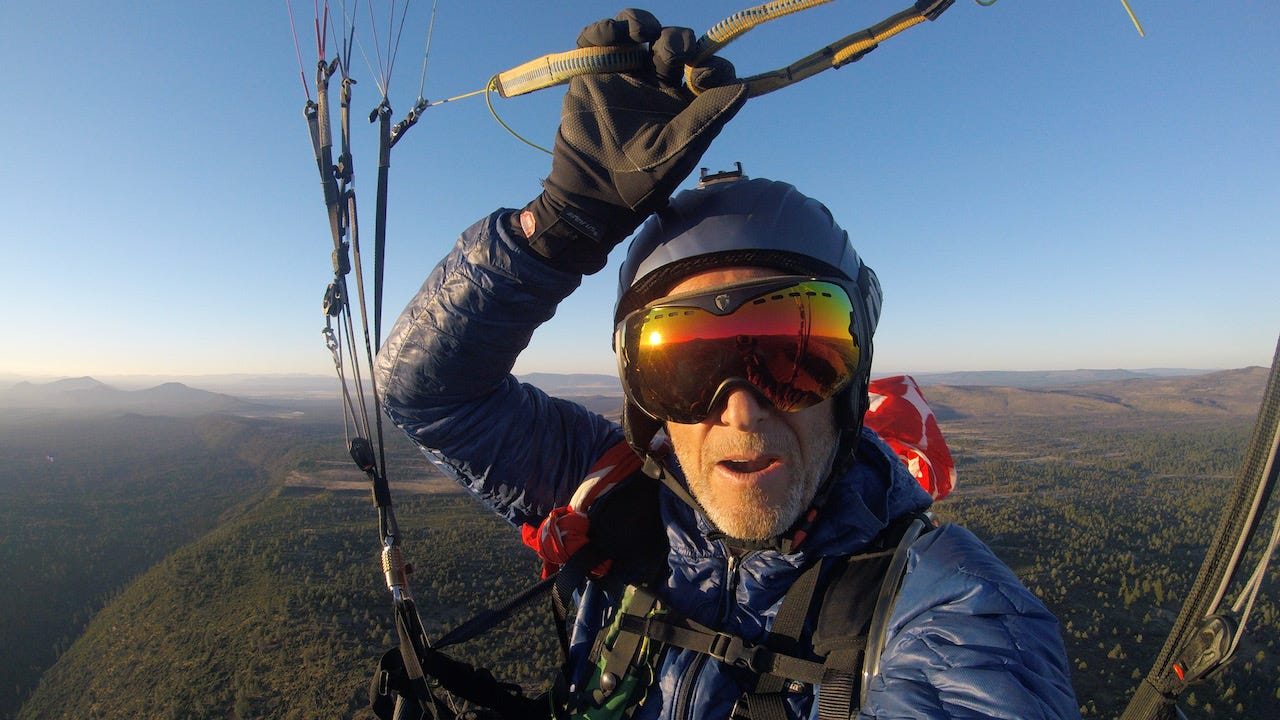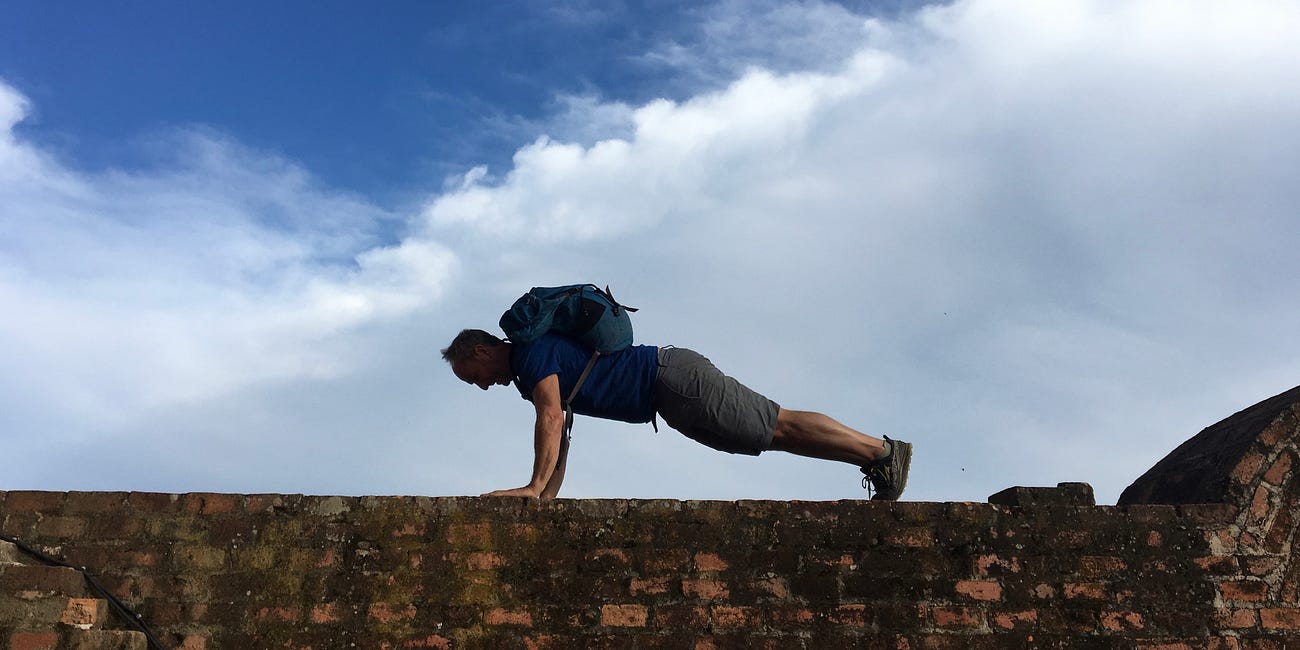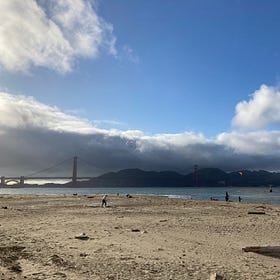By the time I got back home from Manila, the hole in my finger had started to heal—but it was still just that—a hole, ringed in dead, black flesh, and as I’d already known subconsciously when I pushed in the pin to puncture that little blister, the wound would heal, and also: it would be with me forever as a permanent scar. Maybe I was trying to give myself a mark.
Something had been coming to the surface long before I’d flown off to Hong Kong and the islands of Papua New Guinea. I’d say I didn’t know what it was, but most of the reason why I didn’t know was that I didn’t want to know. I didn’t even want to know that I didn’t even really want to go on that voyage on Discovery—but as I’d done so often before, as a lifelong escape artist, I ignored what I didn’t want to know—and then I went.
While the sailing trip had been much too tame to offer any real stimulation, let alone adventure, I still had some other cards to play that winter in terms of getting out in the world. Barely a week after I’d returned, my girlfriend and I flew back across the Pacific to Japan, where we spent two weeks trekking between ramen stands and sake bars. After that it was back to San Francisco again for just a few days, and then I flew to northern Brazil to work there as a guide on two long distance kitesurfing trips, eventually returning home again by way of a stop in New York for Christmas.
All of that meant that until New Years at least, I was running on a steady infusion of physical exertion and, if not full-on type-two misadventure, there was certainly no shortage of real experience, exploration, and excitement. I love California, and I love San Francisco, and just as much as I love being at home, I absofucking-love-love-love traveling, living and working in foreign countries.
When I finally did return from all of those other places, I climbed the stairs of the apartment that I shared with Kate, happy to be back—and already feeling wary of what I’d find there. I took my bags into the bedroom and laid them open on the oak slat bench that my father built nearly fifty years ago from lumber he felled in the same woods in Maine that I ran through as a small boy. The cat came in to keep me company, rubbing her furry belly and wrapping her soft tail around my ankle before curling up on the bed.
As I removed the evidence of my wandering, I felt all the delicious exoticism and jet-travel euphoria draining away—replaced, minute by minute, by an all-too-familiar and yet still formless dread, a pervasive sadness, and, most of all, that old feeling of not knowing.
There was nothing really wrong with how things were for Kate and me, but now that I was home again, and as long as I was there, I was faced again with what had already been becoming apparent before I’d left. Kate wanted children, and although—yet again—I had been open to the idea when we met, when it came down to the doing of it, man, the truth was that I just didn’t have the heart. I’d been a lonely kid—and an angry teen—and, consciously or not, I’d constructed my life in large part to avoid the commitment, constraints, expenses and challenges that I saw so many of my friends struggle with as parents. As with so many others who have chosen not to have children, I appreciated the time I’d get now and then with other people’s kids—and I knew that I could be a good father—but the idea of being dad on a daily basis well, sometimes it was terrifying, but mostly it just wasn’t what I really wanted—and it wasn’t congruent with how I was living.
Even so, I considered, yet again, the possibility of saying yes. I tried to ‘embrace the one-hundred percent,’ as it came to me at the time. I made it a mantra—and still, before long, it became clear that I’d have to let this woman go, so that she could realize her own dreams that were not my own.
I was also faced with the reality that despite having just returned from three months of travel, I had two more overseas trips coming up on my calendar, the first to Cambodia for a business conference, and then an exploratory trip to to Columbia with a fellow kitesurfing guide. As enticing as those felt, the truth was that when I turned my attention to the reality of leaving again so soon, my chest tightened and my eyes filled with tears.
Even with the divergence of our major life directions present in my mind—and no doubt in hers as well—Kate and I loved each other, and we were happy to take up life together again. After a calm and celebratory New Year’s Eve, in early January we had a little party with some friends where I got very excited about the abundance of good wine. I quickly found myself well aware that I’d become what the Italians call sbronzo, which I suppose translates best as having a heat on—and was left feeling gross and heavy the next day, green cartoon gas bubbles urping from my throat up into the frame above my lumpy, constricted, throbbing head, like Captain Haddock in the old Tintin comics.
She went to LA with some friends the following weekend, leaving me at home by myself. For no particular reason other than because I was bored and alone and felt that I deserved it, or could get away with it, or didn’t really care, even with how I’d felt after the party—and even though I was due to meet a friend visiting from Europe the following morning, I had a bottle of wine and a couple of cocktails with dinner and a movie, by myself, and went to bed already knowing that I’d have to cancel on my out-of-town friend.
I spent the next day loafing at home and feeling sorry for myself—ashamed and embarrassed really—and I was still thinking about it that evening as I sat waiting for Kate to return, again on the sofa in our TV room. I sat there and for once, I couldn’t bear pushing the truth away any longer. I couldn’t bear it for myself—and not in the face of the honest love that I felt for and from this woman. I couldn’t help but feel stronger being with her easy-going goodness, and also that I owed her something more than another hangover story—and so I sat right where I was, and instead of turning away, I turned towards a reckoning.
It took some time to unwind.
The fact was that even with the good life that I shared with her, I was feeling depressed yet again, just as I had been before I’d left to go out around the world the last time—and that along the way—and since returning home—I’d chosen to drink more than I really wanted to on several recent occasions.
I’d been in therapy for years working to resolve the depression, which I’d never really thought all that much about, other than to be subjectively certain that far fewer people are actually depressed than the statistics—or the prescriptions—would have us believe. I’d done some reading on the subject more recently though, and as a result, I’d come to think of depression as what I call a “symptom of not living well”—not a predisposition or a chemical imbalance, but as a protest by the organism against how the ego is forcing us to live. A message from the unconscious. An expression of dis-ease.
I knew that I was in denial about how Kate and I felt about having children—differently, that is—and that living with that dissonance was part of the issue, but that didn’t feel like enough to lay me quite so low. Besides, my feelings of depression had been with me long before my relationship with her began.
I was frustrated that I’d ended up feeling depressed again, and that, as I saw it, I didn’t have a good enough reason to feel that way. At that point in my life I’d already changed just about everything about how I’d been living previously. I was healthier than ever before—trail running several miles and doing yoga and pilates regularly, eating well, learning to play the drums, and still living the high life less than three years after having sold my business. I felt healthier and more creatively alive than ever, and aside from our lack of alignment around having children, my relationship with Kate was otherwise stable, calm, loving, supportive, and fun.
If my unconscious, in the form of ‘depression,’ was trying to tell me that something else about how I was living was untenable, what was it?
It might seem like the answer should have been obvious, but it didn’t become clear until right then and there, as I forced myself to confront the reality of having flaked on my visiting friend, at having overindulged at the party, at having consumed too much alcohol in Japan and on my sailing trip in New Guinea. Seeing myself more clearly than ever before, I was able to receive the message that even though that had been me, that was no longer the person that I wanted to be.
The wound on my finger still hadn’t completely healed, and it tingled and itched as I sat there meditating on my situation, reminding me of my how a momentary lapse of judgement and care—could result in permanent damage. Even my finger was trying to tell me something.
I’d already changed just about everything about how I was living.
Everything, that is—except for my relationship with alcohol.
Thing is, I’d been focused on depression as what I was suffering from, not “drinking.”
I’d never been a really heavy drinker, and by that point I’d already been drinking less, and much less often than I had in earlier life—not so much by way of conscious choice to moderate, but because of other changes that were happening in how I was living. For one, I’d come to enjoy running enough that I often found myself prioritizing that over a third, or even a second glass of wine. I’d also started to become aware of a subtle distaste for having a drink in my hand so often. I wanted my hands free, and I wanted to be more free.
Even so, it had never occurred to me that anything less than catastrophically excessive drinking could result in a long-term effect on the psyche.
I remember my high school psychology teacher telling us that alcohol is a “depressant,” but I always understood that to mean that is was a physiological ‘downer’ in contrast to uppers like cocaine and speed—not that it could cause this thing called “depression.” Perhaps also because depression wasn’t something much talked about in those days anyhow, nobody ever suggested a connection between alcohol and depression as a persistent state of mind—not back in high school, not my friends or lovers over the years, and not in all my years of therapy.
Right at that moment, something came rushing to the surface, and then resolved into clarity like a winter pond suddenly reaching the freezing point and, in an instant, being rendered solid, and transparent, by a layer of black ice.
What if drinking was making me depressed?
Stunned into immobility, I felt the the weight of my body drop away as I stared straight ahead at nothing but the white of the walls. The realization that I’d been so naïve, so immature and ill-advised—and that there could be a real reason that I had spent so much time feeling so fucking horrible for so much of so many years—that realization pinned me to my seat and had me drawing long, deep breaths of shock—and of relief.
It was just a month before my forty-eighth birthday. I wasn’t born depressed, nor with a drinking habit. These two patterns co-evolved, and now it was becoming clear that I could work all I wanted on feeling less depressed, but that I had been ignoring the most important contributing factor. I wasn’t just suffering from yet another mid-grade morning hangover—I was suffering from a whole other type of much larger hangover for all those years. I wasn’t just feeling sick and weak that day—I was feeling the cumulative psychological sickness and weakness of all of those years of imbibing a depressant.
My body had spoken up in recent years about getting more active, about kiting, trail running, swimming in the bay, about selling my business—even about moving out of the city of San Francisco itself—and now my body was finally speaking up about depression and drinking.
Kate returned later that night, but I didn’t tell her of my epiphany right then, as I still hadn’t quite reached the point of taking action on that score. However, one thing that had become clear was that I couldn’t stomach leaving again so soon. As we were going to bed that night, I told her I’d decided to cancel those upcoming trips to Cambodia and Colombia, and I fell into sleep feeling lighter than I had since my return.
Less than a week later, we went to another party, this time for one of my friends from the kitesurfing scene at Crissy Field. Everyone was anxious to hear of our round-the-world travels. The host had sprung for a well-stocked bar, and I went straight for it, pushing past one of our local superhero sailors in my haste to get a drink in my face.
When I turned around, Superman was talking with another friend and his wife J, with whom I shared harmlessly flirtatious friendship. I’d ordered whatever Chip was drinking—tequila and ginger ale—not a bad combination, and it went down so well and in the company of close friends that I kept the five of us parked right there by the bar, and knocked back three more in quick succession. We all seemed to be having a blast, but as I was reaching for drink number four, one arm was around Kate’s shoulders, and the other was reaching for J.
She was always very warm with me—and also, gracious and respectful of our primary relationships. For my part, even more than however much I was attracted to her, she was a sister first, and so when I felt myself using my strength to pull her in, wanting to feel her warmth, I flushed with shame at my greed and released my grip, feeling sure that I’d overstepped. I saw a shadow cross her husband’s face.
I was suddenly overcome with a wave of exhaustion. We’d only been at the party forty-five minutes, but I felt woozy and lame. I turned to Kate and suggested that we leave, right then. My friends waved off my muted apology, and home we went.
The following morning, I shared with Kate something more of what had been on my mind that past week. I said that what had come to me was that “depression is like psychic heartburn”—we get it from being forced to digest things that are “incongruous with our soul.” I walked her through my subtle slip-up with J, the rapid over-drinking that had led up to it—and revisited the night of the other party, where I’d also had too much to drink, too quickly, and not enjoyed the result.
Bless her, because it was Kate that spoke up right then and there to say, “why don’t we take a break from drinking, just for a week.” Almost before she finished her sentence, I rushed to say, “Great idea, let’s do that,” and as I did, I was already thinking ’perhaps indefinitely.’
I’d never made a point of reading anything about alcohol, drinking, or addiction—or perhaps I’d made a point of not reading anything about it—but in that same week I found meaningful substantiation for the connection between depression and drinking in Johann Hari’s Lost Connections, a connection which was further confirmed several weeks later when I picked up a copy of a book called This Naked Mind in a bookstore in Aspen.
Like most people, I hadn’t had any words to describe my relationship with alcohol, aside from “drinking”—and the idea of “stopping” always seemed like it only applied to people who had a much more serious problem. Of course I’d known for many years that drinking wasn’t exactly good for me, but I’d thought all along that my problem was depression, and I’d remained focused on fixing that.
In the meantime, beer, wine and cocktails had been my lifelong companions. They’d taken the place of real friends—and of the wild outdoors that I knew in my youth. Drinking had given my body some real sensation—something that felt like something all of those years, and so for all those reasons and others, time and time again, I’d punted any real examination of my patterns around alcohol.
Even with the warnings I’d experienced—the violent and terrifying anxiety attack in my kitchen, the hit-and-run car crash, and, most recently, the necrotic infection on my finger—I somehow hadn’t gotten a clear message, or gotten it strongly enough. I’d always felt that my relatively moderate drinking wasn’t a real problem.
And perhaps it wasn’t—not all by itself.
Even more than the knowing, it was, again, my body that insisted on a change. My body was refusing to be depressed any longer, it was refusing to allow me to leave home again—and it was telling me that now, after all these years, it was time to change my relationship with alcohol.
For once, I knew something had to change—and I stopped drinking that very same day.
Thanks for reading, and for being part of this journey.
This is part of AN ORDINARY DISASTER, one man's proof that despite what may seem like our inability to hear it, and all of our attempts to avoid it, we can all learn to listen to ourselves, and to act upon the inner voice of our self, our sanity and our soul.
Further reading
Born to Run by ‘barefoot runner’ Christopher McDougall
What I Talk About When I Talk About Running by Haruki Murakami
Stanton Peele, Love and Addiction
Dr. Adi Jaffe, The Abstinence Myth
Annie Grace, This Naked Mind — my favorite book on how to change your relationship with alcohol
Johann Hari, Lost Connections
Caroline Knapp, Alcohol, A Love Story
Marc Lewis, The Biology of Desire: Why Addiction Is Not a Disease
Here’s the table on contents for my memoir in progress. You might also enjoy some of my other writing on subjects mentioned here, such as:
How physical fitness supports my creativity and my work as a writer
Just a couple of months ago, I wrote about a horrible attack of a sciatica that laid me out for two weeks straight and reminded me how devastating it is to be even partially physically debilitated. That episode had its roots in an injury that I sustained more than 20 years ago, the reason for which I knew just as well then as I do now: a lack of enough …
Sex is Better Sober ...and 23 other reasons why Alcohol is Obsolete
I like to use the word obsolete to refer to something that’s perhaps not quite already entirely of the past but that’s on its way out, that should be gone soon, and that I am choosing to remove from my consciousness. By declaring something obsolete I’m no longer referring to it as present in my life.
or any of the other essays that you can find here:
Eighteen essays about addiction, masculinity, creativity, and intuition
I recently divided my stack into sections—memoir, essays, mediations, and perhaps soon more—and in doing so I was reminded that I’ve put out no fewer than eighteen long form essays so far here, on topics ranging across anxiety, fitness, creativity, sobriety, self-discipline, purpose, love, adventure, sciatica, pain, AI, intuition, the collective unconsc…
I’ve got some questions for you
Have you experienced depression? If so, what do you feel is the root cause, and why?
What’s your own relationship with alcohol and how has that changed over time?
How do you know what’s right for you—and how has that changed?
Please share, comment, restack, recommend, and click the little ♡ heart right there 👇🏻 if you dig this piece. I’d love to hear from you!








Bowen, there is a lot in this chapter that resonates with me. I'm about to turn 48 in September, and I gave up alcohol a little over a month ago. Even in moderate amounts, it seemed to interfere with my sleep. And I became increasingly aware that reaching for a drink or two at happy hour was a crutch of sorts, even if it never led to excess. I much prefer the feeling that I'm only putting good things into my body and purging the bad, usually on the bike, in my running shoes, or in the gym.
But your post also goes to the larger existential stressors that life in America brings. And the particular struggle you faced in contemplating fatherhood is one of those. I don't think men are terrified of fatherhood because they can't imagine themselves as caregivers. It's that they can't see a place for themselves in the working world that harmonizes with a caregiving role. It feels like a zero sum proposition: be an alpha at work and depend on a spouse for caregiving or give up ambition and embrace a traditionally feminine role. Women feel this pressure, too. Everyone feels like they can't be good at their job and good at parenting. This causes an incredible amount of stress. It's also linked to American rootlessness. In cultures where caregiving is shared among an extended family, rather than being the relentless obligation of one or two parents, the stakes for starting a family feel different.
Yeah depression is definitely not something that just randomly happens in the brain, most often theres something in life that brings it on. Of course the chemicals and their interactions matter, but I wish our mental health world were more attuned to the social and material environments our brains are living in.